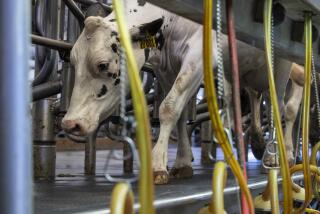Cow DNA found in human breast milk purchased online
Is breast milk always best for babies? Not when it’s purchased over the Internet, according to a new study.
Researchers who tested 102 samples of breast milk purchased from popular milk-sharing websites found that one in 10 contained substantial amounts of cow DNA.
Further tests ruled out the possibility that the cow DNA was the result of minor or incidental contamination and suggested that the tainted breast milk had probably been mixed with cow-milk-based baby formula.
“We confirmed that all of the samples did have human DNA in them, but they were not 100% human breast milk,” said Sarah Keim, an epidemiologist at Nationwide Children’s Hospital in Columbus, Ohio. “One of our samples was almost half and half formula and milk.”
The research, led by Keim, was published online Sunday in the journal Pediatrics.
According to the authors, 21% of parents who seek breast milk over the Internet are doing it for a child with a preexisting medical condition. In addition, 16% of those looking to purchase breast milk say that their child has a formula intolerance.
Keim and her team have been studying the trend of buying, selling and sharing human milk online for four years. Although both the Food and Drug Administration and the American Academy of Pediatrics have been clear that they do not think purchasing milk over the Internet is a good idea, it is a trend that has continued to grow.
Back in 2011 the researchers estimated that there were 13,000 people who participating in these transactions. Today, they say the number has grown to 55,000.
“People feel a lot of pressure to breast-feed and guilt and disappointment if they are not successful,” Keim said. “I think that is underlying a lot of the demand for milk online.”
In a previous study, the same research group found that three quarters of human milk purchased over the Internet was contaminated with Gram-negative bacteria, which can cause serious illness in infants with compromised immune systems.
“Our series of studies clearly back up the warnings of the FDA and the AAP that acquiring milk for your baby in this way does pose multiple risks to your baby in terms of health and safety,” Keim said.
She added: “I feel for women who desperately want to feed their babies breast milk, but they have no way to know it is safe.”
Science rules! Follow me @DeborahNetburn and “like” Los Angeles Times Science & Health on Facebook.







